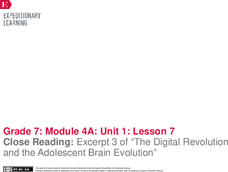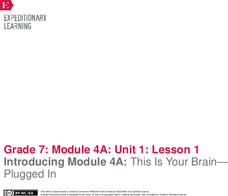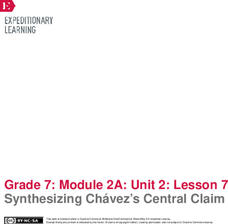Curated OER
Ballad
Young balladeers analyze examples of ballads and generate a list of common traits (story, quatrains, rhyme schemes, refrains, etc.), then identify these traits in Robert W. Service's "The Cremation of Sam McGee" and a ballad written by...
Curated OER
Concrete Poems
Concrete poems, or shape poems as they are sometimes called, are the focus of the eighth lesson in this poetry unit. Young scholars examine several examples of concrete poems and consider how the shape contributes to the poem's meaning.
Curated OER
What Is Poetry?
The first lesson of 12 in a poetry unit asks class members to develop their own definition of poetry. After crafting a response, they examine a variety of examples and decide if the resources are or are not poems.
Curated OER
Putting it Together: Analyzing and Producing Persuasive Text
Young orators demonstrate what they have learned about persuasion and persuasive devices throughout the unit by analyzing a persuasive speech and then crafting their persuasive essays. Class members engage in a role-play exercise, use...
Core Knowledge Foundation
Unit 7: Anne Frank’s Tales from the Secret Annex Teacher Guide
Frequently banned, often challenged, a mainstay of middle school curriculum, Tales from the Secret Annex, is the featured text in the seventh unit in the Teacher Guide Core Knowledge Program. The 134-page guide includes an introduction,...
Core Knowledge Foundation
Unit 6: The Genius of the Harlem Renaissance Teacher Guide
Introduce your seventh graders to the Harlem Renaissance with a unit that explores this dynamic period's music, literature, and ideas. The 160-page guide includes a unit calendar, an introduction to the unit, 10 richly detailed lessons...
EngageNY
Analyzing Main Ideas and Details: Why Care about Water?
Pay attention to details! After completing text-dependent questions about paragraphs 10-12 of "Water is Life," scholars view the video "Why Care about Water. "They view the video three times and use a Main Idea and Details note-catcher...
EngageNY
Analyzing Text Structure: “Water Is Life” Paragraphs
Water, water everywhere. Readers revisit paragraphs six through nine in the article "Water is Life" to answer text-dependent questions. They then pair up to reread the article focusing on its structure and record their thoughts on...
EngageNY
End of Unit Assessment: Analyzing an Informational Text
Scholars wrap up the unit by taking an assessment and reading the informational text "You Trouble" by Justin O'Neill. As they read, they answer multiple-choice questions and complete charts to analyze the main idea and supporting details...
EngageNY
Close Reading: Excerpt 3 of “The Digital Revolution and the Adolescent Brain Evolution”
It's time to level up and discover how video games affect the brain. Pupils explore the topic as they continue reading excerpts from an article about adolescent brain development and the digital revolution. Scholars also participate in a...
EngageNY
Introducing Module 4A: This Is Your Brain—Plugged In
What does brain science reveal about teens and decision making? Scholars watch a short video and participate in a gallery walk to pique their interest and curiosity about the topic. Next, they begin reading an informational article about...
EngageNY
End of Unit Assessment: Analyzing the Structure of Chávez’s Wrath of Grapes Speech
César Chávez gave his 1986 "Wrath of Grapes" speech to educate consumers about pesticide use. Scholars complete an end of unit 2 assessment, applying what they learned throughout the unit to a new text. They then analyze the structure of...
EngageNY
Synthesizing Chávez’s Central Claim
Class members play an interactive game, matching strips of paper containing rhetorical devices with examples from César Chávez use rhetoric in his 1984 speech, "Address to the Commonwealth Club of California." Next, partners discuss...
EngageNY
Speech Structure: Part 2 of the Commonwealth Club Address
Scholars continue reading and analyzing César Chávez's 1984 speech, "Address to the Commonwealth Club of California." Working with partners, they answer text-dependent questions about how governments and consumers affect working...
EngageNY
Mid-Unit Assessment: How Chávez Develops His Claims in the Commonwealth Club Address
Scholars complete a mid-unit 2 assessment, analyzing how César Chávez supports his claims in his 1984 speech, "Address to the Commonwealth Club of California." Learners focus on paragraphs 18 and 19 of the speech, answering text-based...
EngageNY
Speech Structure: Unions as Agents of Change— Part 2
Scholars continue reading César Chávez's 1984 speech, "Address to the Commonwealth Club of California." Working with partners, they complete graphic organizers to determine a claim that Chávez makes about the UFW.
EngageNY
Reading Closely: Introducing Chávez’s Commonwealth Club Address and Considering the Plight of the Farmworker
How can a persuasive speech help inspire social change? Scholars read along as they listen to the first half of César Chávez's 1984 speech, "Commonwealth Club Address." Next, pupils use graphic organizers to analyze one of Chávez's...
EngageNY
Analyzing Text Structure: “Teen Slang: What’s, Like, So Wrong with Like?”
What did you say? Class members read Teen Slang: What’s, Like, So Wrong with Like and make notes in the margin to determine the gist. They then analyze the text to identify claims made and the evidence to support the claims. After ...
EngageNY
End of Unit Assessment: Claims, Interactions, and Structure in “Is Money Affecting Your Social Status?”
It's not about the money. Scholars use the text Is Money Affecting Your Social Status? to complete their end-of-unit assessments. After finishing the assessment, they discuss how the text relates to their working definition of identity...
EngageNY
Analyzing Text Structure: “Generation Z Stereotyped”
Breaking the stereotype. Readers use the Generation Z Stereotyped Structure anchor chart and find the central idea of the text. They then read Generation Z with partners and discuss the text using guiding questions. Finally, they answer...
Echoes & Reflections
Contemporary Antisemitism
Despite the recognized atrocities of the Holocaust, anti-semitism continues. The 11th and final installment of the Teaching the Holocaust series explores the long-term effects of the Holocaust on modern anti-semitism, asking pupils to...
Echoes & Reflections
Perpetrators, Collaborators, and Bystanders
After the Holocaust, the world grappled with how to bring justice to the Nazis. But what to do with the thousands—if not millions—who allowed it to happen? Young historians consider the issues of guilt, collaboration, and responsibility...
Echoes & Reflections
Antisemitism
Propaganda and anti-semitism were linked to evil ends during the Holocaust. Using video testimony of Holocaust survivors, examples of Nazi propaganda, and discussion questions, learners explore the roots of anti-semitism in Europe and...
Newspaper Association of America
Celebrating Women’s History Month
Examine the lives of four women—Blanche Stuart Scott, Madeleine L'Engle, Margaret Evans Price, and Sybil Ludington—in a 23-page activity packet. Each profile comes with a set of vocabulary and reading comprehension questions. Further...

























